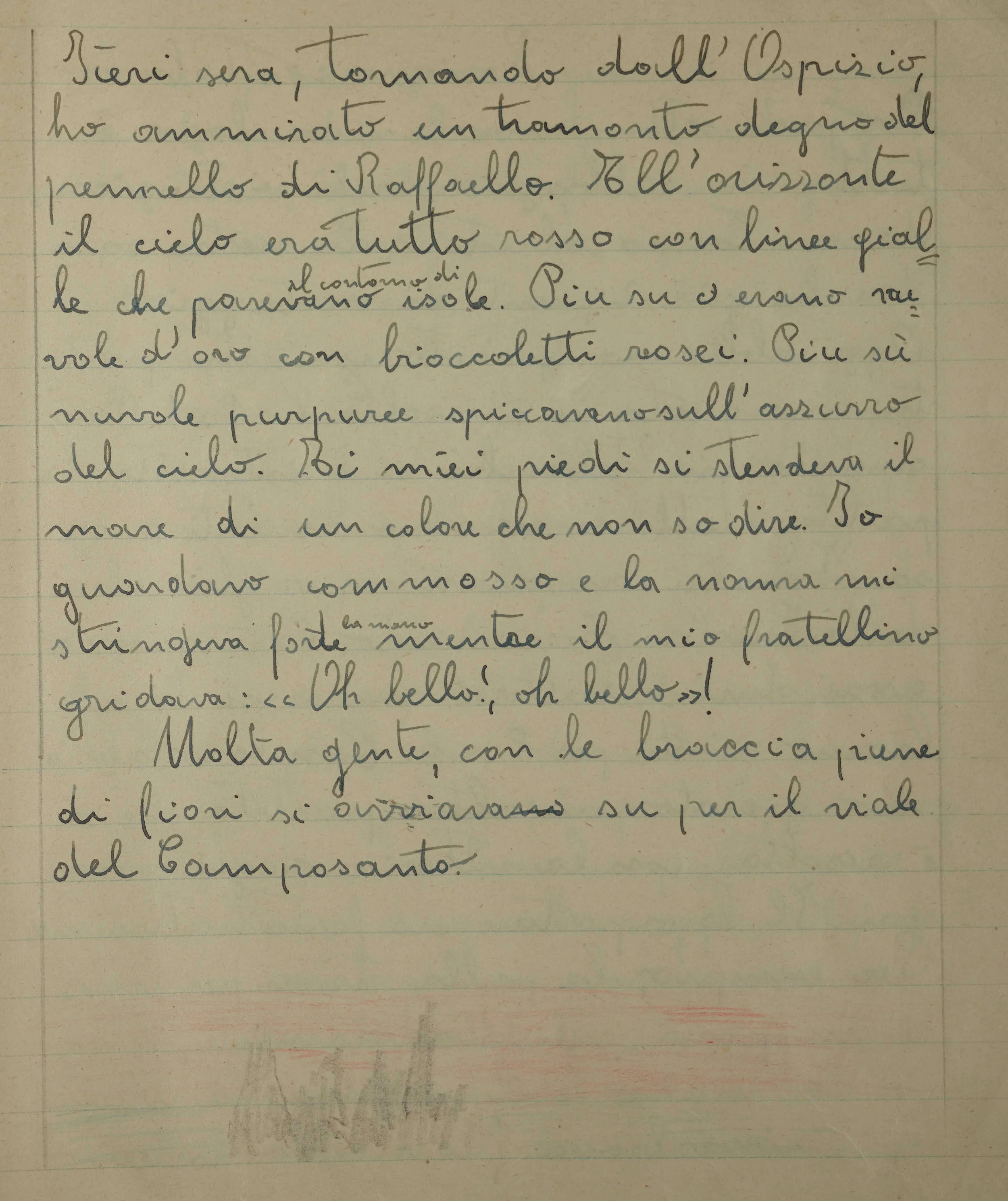24 October 1942 - In the Garden / Nel giardino
© Tramonto - Foto di Claudio Rocco, da Rovigino
Rovigno 24 October
Autumn has arrived with a gust of wind and a rain shower. The rain was short-lived and the dry and dusty earth was moistened. The countryside was revived and made more beautiful. Here and there, in my garden, the last red dahlias peep out. A few chrysanthemums open their rosy leaves that seem to tremble on contact with the air.
Rovigno 24 ottobre
Autunno è arrivato con una folata di vento e uno scroscio di pioggia. La pioggia è stata di breve durata e il terreno arido e polveroso si è inumidito. La campagna si è rinverdita e fatta più bella. Qua e là, nel mio giardino, occhieggiano le ultime dalie rosse. Qualche crisantemo apre le sue rose foglioline che sembrano tremare al contatto dell’aria.
Everyone rushes to transplant onions, turnips, chard. I helped my dad to plant one hundred onions and as many strawberries. My little brother helps me wash the strawberries because he is greedy for their fragrant fruits. While our feet sink in the damp earth it’s also necessary to tuck the cabbage and savoy in the soil. One collects the last of the Victory stringbeans, and, if the boys have not taken them away, the pomegranates.
Tutti si affrettano a trapiantare cipolle, rape, erbette. Io ho aiutato mio papà a piantare cento cipolle e altrettante fragole. Il mio fratellino mi aiuta a bagnare le fragole perché è goloso dei loro fragranti frutti. Bisogna pure rincalzare il terreno ai cavoli e alle verze mentre i piedi affondano nell’umido terreno. Si raccolgono gli ultimi fagioletti Vincere, e, se i ragazzi non se li sono portati via, i rossi melogranati. [sic]
Franco wrote “i rossi melogranati” in the original diary. However, the word melograno indicates the tree, while melagrana is the fruit, and melagranata is a rarer form of the word. I think Franco meant the fruit, since the little boys could not steal the trees.
[Franco ha scritto <i rossi melogranati> nel diario originale. Comunque, la parola <melograno> significa l'albero, e <melagrana> è la frutta, e <melagranata> è una forma rara della parola. Penso che Franco abbia significato la frutta, siccome i ragazzini non potessero rubare gli alberi.]
The leaves of the trees turn yellow and fall, hovering a little in the air. I think with sadness that the trees will soon be bare while I am wrapped in my warm coat. The days are shorter but you enjoy the magnificent sunsets in return.
Last night, returning from the Hospice, I admired a sunset worthy of the brush of Raphael. On the horizon the sky was red with yellow lines that seemed to outline the islands. Higher were golden clouds with rosy little wisps. Higher, purple clouds stood out over the blue sky. At my feet lay the sea, a color that I don’t know how to say.
I watched, moved, and my mother gripped my hand tightly while my brother shouted “Oh, beautiful! Oh, beautiful!” Many people, with arms full of flowers, came up the drive of the Cemetery.
Le foglie degli alberi ingialliscono e cadano volteggiando un po’ nell’aria. Penso con tristezza che gli alberi presto saranno nudi mentre io sarò avvolto nel mio caldo cappotto. Le giornate si fanno più brevi ma, in compenso si godono dei magnifici tramonti.
Ieri sera, tornando dall’Ospizio, ho ammirato un tramonto degno del pennello di Raffello. All’orizzonte il cielo era tutto rosso con linee gialle che parevano il contorno di isole. Più su c’erano nuvole d’oro con bioccoletti rosei. Più sù nuvole purpuree spiccavano sull’azzurro del cielo. Ai miei piedi si stendeva il mare di un colore che non so dire.
Io guardavo, commosso, e la mamma mi stringeva forte la mano mentre il mio fratellino gridava <<Oh, bello! Oh, bello!>> Molta gente, con le braccia, piene di fiori si arrivava su per il viale del Camposanto.
I believe the Ospizio refers to the Ospizio marino di S. Pelagio, a hospice for children opened by Archduchess Maria Teresa of Austria, in 1888. (See page 215, of Atti e memorie della Società istriana di archeologia e storia patria, by Prof. B. Benussi.) Set alongside the bay, this may be the likely setting where little Franco looked out over the water, admiring the sunset.
Nearby is the Church of St. Pelagius, and while I can find no mention of a cemetery, likely there was at least a small one nearby. The hospice still stands today—it is the Dr. Martin Horvath Orthopedic and Rehabilitation Hospital. In the picture, you can see St. Pelagius with its two towers, flanked on either side by the Hospital and the Hospice.
Below is a postcard showing the hospice, from the website Cartoline di Rovigno dalle collezione di Anita Derin & Luigi Vianelli:
For more photos, please visit Istria on the Internet, and thanks also to its purveyor, Marisa Ciceran for much valuable information.









